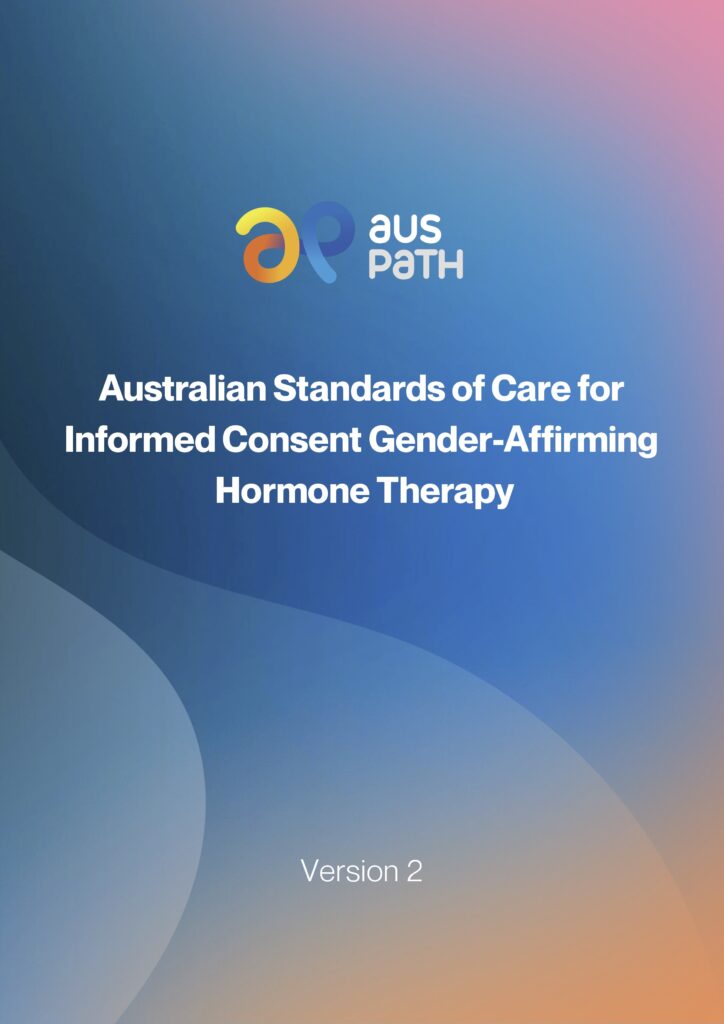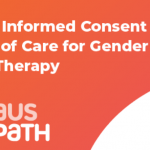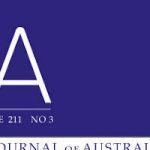Standards of Care
The AusPATH Board of Directors welcome endorsement applications for new Australian guidelines, proposed research and advocacy and policy submissions related to furthering AusPATH’s aims.
The endorsement process may take several months because the AusPATH Board and sub-committees are volunteer run, therefore capacity may be limited.
While this service is free, AusPATH welcomes donations in order to strengthen our education and advocacy activities.
Australian Standards of Care for Informed Consent Gender-Affirming Hormone Therapy
1 December 2025

The AusPATH Australian Standards of Care for Informed Consent Gender-Affirming Hormone Therapy (2025) provides clear, practical guidance for GPs and other primary care clinicians delivering safe, evidence-based gender-affirming hormone therapy. It outlines an informed-consent model tailored to Australian primary care, supports clinicians in managing common clinical scenarios, and helps reduce barriers to care for transgender and gender diverse adults. The Standards also describe the legal and clinical considerations for adolescents, people in care, and others requiring additional safeguards.
- AusPATH: Australian Informed Consent Standards of Care for Gender Affirming Hormone TherapyTo mark Trans Day of Visibility on Thursday 31 March 2022, Australia’s peak trans health body AusPATH has launched the Australian Informed Consent Standards of Care for Gender Affirming Hormone Therapy. These new national Standards of Care are intended to assist and enable clinicians across Australia to better meet the medical gender affirmation needs of… Read more: AusPATH: Australian Informed Consent Standards of Care for Gender Affirming Hormone Therapy
- Equinox: Protocols for the Initiation of Hormone Therapy for Trans and Gender Diverse PatientsPROTOCOLS FOR THE INITIATION OF HORMONE THERAPY FOR TRANS AND GENDER DIVERSE PATIENTS AUGUST 2020 Equinox Gender Diverse Health Centre provides trans affirmative and person-centredhealth care by emphasising partnership, education, and self-determination. We view treatment as a collaborative effort between the patient and provider. We striveto establish relationships with patients in which they are the… Read more: Equinox: Protocols for the Initiation of Hormone Therapy for Trans and Gender Diverse Patients
- Hormone therapy for trans and gender diverse patients in the general practice settingBackground In recent years there has been a significant increase in the number of trans, gender diverse and non-binary (TGDNB) people accessing healthcare. For many of these individuals the first port of call will be to their local general practitioner (GP). The TGDNB community is a high-priority population with the highest suicide rates of any… Read more: Hormone therapy for trans and gender diverse patients in the general practice setting
- Position Statement on the Hormonal Management of Adult Transgender and Gender Diverse IndividualsIntroduction Rising demand for gender-affirming hormone therapy mandates a need for more formalised care of transgender and gender diverse (TGD) individuals in Australia. Estimates suggest that 0.1–2.0% of the population are TGD, yet medical education in transgender health is lacking. We aim to provide general practitioners, physicians and other medical professionals with specific Australian recommendations… Read more: Position Statement on the Hormonal Management of Adult Transgender and Gender Diverse Individuals
- Australian Standards of Care and Treatment Guidelines for Trans and Gender Diverse Children and AdolescentsIntroduction The Australian Standards of Care and Treatment Guidelines (ASOCTG) aim to maximise quality care provision to trans and gender diverse children and adolescents across Australia, whilst recognising the unique circumstances of providing such care to this population. Recommendations are made based on available empirical evidence and clinician consensus, and have been developed in consultation… Read more: Australian Standards of Care and Treatment Guidelines for Trans and Gender Diverse Children and Adolescents
- Standards of Care for the Health of Transgender
and Gender Diverse People, Version 8Use of these Standards of Care AusPATH recommends judicious use of the SOC 8 together with the Position Statements that AusPATH has released.
https://auspath.org.au/wp-content/uploads/2024/07/Including-Trans-People-in-Research_FINAL.pdf
The trans experience of gender has long been pathologised, criminalised, stigmatised, and medicalised, and as such, trans health and trans research is in its infancy. It’s time for that to change.
There has previously been little guidance for researchers on how to accurately and meaningfully include demographic data which includes trans people in any form of health or medical research. The invisibility of trans people in research contributes to the marginalisation and health disparity experienced by the trans community and presents a barrier to allocation of resources, and trans-affirming practice and policy.
To address this gap, these guidelines have been developed to equip Australian researchers with the information needed to collect gender data in a way that is inclusive and affirming of trans people.





